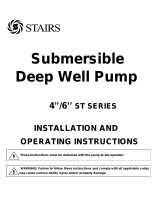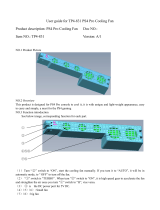
wc_tx0003911gb.fm
17
PS 3-Phase Pump Operation
2.12.3 Adjust the setting of the overload protector (i.e. circuit breaker) to the
pump’s rated current.
Note: Verify the rated current on the pump’s nameplate.
2.12.4 When using a generator, as much as possible avoid operating the
pump in conjunction with other types of equipment.
2.13 Trial Operation
NEVER start the pump while it is suspended, as the pump may jerk
and cause a serious accident involving injury.
NEVER start the pump where people are present, as they may suffer
electrical shock from current leakage.
Be sure to check the pump’s direction of rotation when the pump is
exposed to atmosphere (a). Utilize a hoist to stabilize the pump on a
level surface while performing this check. Operating the pump in
reverse while it is submerged in water will damage the pump, which
may lead to current leakage, electrical shock, or fire.
2.13.1 The impeller will rotate counterclockwise (b), as viewed from the
bottom of the pump. Operate the pump for a short time (1 to 2 seconds)
to check the rotational direction of the impeller.
Before changing the connections for reverse rotation, make sure that
the power supply (i.e. circuit breaker) is properly disconnected and that
the impeller has stopped completely. Failure to observe this may lead
to serious accidents, including electrical shock, short, or injury.
• To reverse the rotation, the following countermeasure must be taken.
COUNTERMEASURE: Interchange two of the three wires designated
U, V and W respectively (c), or follow control system manufacturer's
instructions to utilize rotary field control and phase inverter function of
the control system supplied with the pump.
2.13.2 Operate the pump for a short time (3 to 10 minutes) and perform the
following checks.
2.14 Operating current
Using an AC ammeter (clamp), measure the current at the phases U,
V, and W that are connected to the terminal board.
COUNTERMEASURE: Because an overload condition may be
present at the motor if the operating current exceeds the rated current,
refer to Section Installation in this manual for procedures on reverting
the motor to the correct state.
2.15 Operating voltage
Use an AC voltmeter (tester) to measure the voltage at the terminal
board.
Power supply voltage tolerance = within ±5% of the rated voltage
























